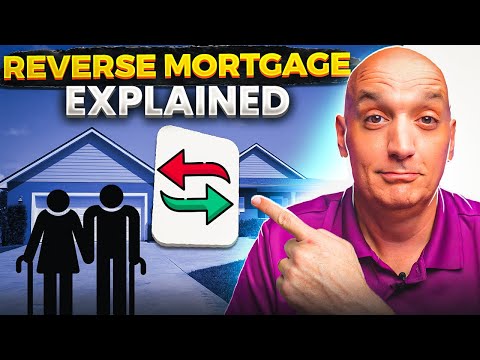Decoding the Basics: What Is a Reverse Mortgage?
Ever heard about drawing cash from your home’s equity without selling it? Well, that’s where the definition reverse mortgage kicks in! Simply put, a reverse mortgage is a loan that allows homeowners usually aged 62 or older to convert part of their home equity into cash. Now, don’t go thinking it’s a free ride; this loan is repaid when you sell your home, move out, or bid the world adieu.
The reverse mortgage meaning is enmeshed in the idea of a ‘reverse’ flow. Unlike a traditional mortgage where you make monthly payments, the lender pays you in a reverse mortgage. It comes with its own reverse mortgage requirements, including age, equity in your home, and type of home, among others.
The Mechanics: How Does a Reverse Mortgage Work?
Perhaps you’re scratching your head, pondering, “How do reverse mortgages work?” Let’s break it down, step by step:
Strap in, because the role of home equity in reverse mortgages is central. The amount you can borrow hinges on your home’s value — generally, you could bag about 40% to 60% if you’re lucky. Remember, your abode is part of the deal; its title remains yours as long as you’re clocking time there.
Cue in the reverse mortgage facts: Interest rates and fees can throw a spanner in the works because, honestly, reverse mortgages can be pricey compared to other loans. And, they could lob you into foreclosure if you’re not careful.

| **Aspect** | **Details** |
|---|---|
| Product Type | Reverse Mortgage Loan |
| Eligibility | Typically borrowers must be 62 years old or older, own their home, and have substantial equity. |
| Loan Amount | Usually between 40% to 60% of the home’s appraised value. |
| Loan Costs | High compared to other loans, including origination fees, closing costs, servicing fees, mortgage insurance premiums. |
| Payout Options | Lump sum, monthly payments, line of credit, or combinations thereof. |
| Interest and Fees | Typically accumulates over time, with the amount owed increasing as more money is paid out and interest charges accrue. |
| Title and Ownership | Title remains with the homeowner; they are required to maintain the property and pay all related taxes and insurance. |
| Impact on Spouse | A qualifying spouse can remain in the home after the borrower dies or moves to a nursing home if they meet certain conditions. |
| First-Year Limitation | In the first year, access is limited to 60% of the approved loan amount, or enough to pay off the existing mortgage plus 10%, to discourage rapid depletion of equity. |
| Repayment | No monthly payments are required; the loan becomes due when the borrower dies, sells the home, or fails to meet loan obligations. |
| Risks | Potential for foreclosure if obligations are not met, including property maintenance, taxes, and insurance payments. |
| Federal Insurance | Home Equity Conversion Mortgages (HECMs) are insured by the Federal Housing Administration (FHA). |
| Equity Impact | Reduces the homeowner’s equity in their home over time. |
| Counseling Requirement | Borrowers must receive counseling from a HUD-approved agency before obtaining a HECM. |
Qualifications and Limitations: Who Can Benefit from a Reverse Mortgage?
So, who’s this financial contraption ideal for? What are reverse mortgages best suited for? Picture retirees looking to boost their cash flow without moving out of their cherished homestead. The reverse mortgage eligibility criteria are no kids’ play — age, the equity you’ve cooked up, and the home type are put under the microscope.
Digging deeper into reverse mortgage facts, don’t expect to cash in your mansion’s worth; there are loan limits to tame your wild dreams. And don’t even think about using that fancy getaway cabin — specific property types are required for the deal.

Pros and Cons: Is a Reverse Mortgage a Good Idea?
Let’s chew the fat on this: is a reverse mortgage a good idea? Here’s the lowdown — weighing the benefits, a reverse mortgage can be a financial lifesaver for seniors in a cash crunch, staying put in their hearthstone while the funds roll in.
Now, onto the understanding the downsides: Remember Scrooge McDuck’s vault? Imagine it slowly emptying. That’s your equity with a reverse mortgage. And let’s not forget those hefty fees and potential foreclosure haunts.

The Process: How Do Reverse Mortgage Applications Work?
Tackling a reverse mortgage is like following a secret recipe. From counseling to closing, you’ve got to prep up with a dash of financial advice (spiced with mandatory counseling) and muster up a downpour of necessary documentation. Stir in a wee bit of patience for those expected timeframes, and Bob’s your uncle.

Top Providers: Evaluating Reverse Mortgage Companies
Eeny, meeny, miny, mo, catch a lender by the toe. Reverse mortgage companies are plentiful, but only a few are the pick of the litter. Sashay through consumer ratings and industry reputation to find your star player. Be Sherlock in disguise and scrutinize to your heart’s content.
The Payout: Reverse Mortgage Disbursement Options
Read on how lump sum, tenure, term, line of credit: how do reverse mortgages work financially? Each option has its signature dance moves, but it’s your tune that calls the shots. Flexibility jives with this serenade — changing needs: how do reverse mortgage work with varying payment plans can accommodate your dynamic financial symphony.
Tax Perspective: The Financial Implications of Reverse Mortgages
It’s time to get tax-savvy: unpacking tax benefits and obligations in reverse mortgages is crucial. And hey, don’t just stash that in your back pocket; wondering how does it work with your estate plan? Consult a maestro in the cost Of setting up a trust to lay out a smooth path for your legacy.
Safeguards and Regulations: Understanding Reverse Mortgage Protections
Even daredevils need a safety net, and that’s where federal insurance and borrower safeguards swan in. But remember, your local sheriff might have a word too — so navigating state and local reverse mortgage regulations is no less critical than getting the perfect avocado toast.
Reality Check: Real-Life Scenarios Where Reverse Mortgages Shine
Fancy a nosy peek into your neighbor’s finances? Get your fix with case studies: how does reverse mortgage work in practice? Folks just like you spill the tea on managing retirement with a bit of reverse mortgage magic. Meet the retirees — the living, breathing proof: how do reverse mortgages work for retirees?
Aftermath: What Happens When a Reverse Mortgage Comes Due?
Who’s left holding the bag when the music stops? Reverse mortgage facts: settlement, repayment, and non-recourse features make sure your kin aren’t pulling their hair out. As for the heirs and estate handling post reverse mortgage maturity, let’s just say it’s no Greek tragedy if planned well.
Innovation in the Industry: The Future of Reverse Mortgages
Got your crystal ball handy? Emerging trends: how does reverse mortgage work tomorrow could have a different flavor with technological advances and new reverse mortgage products on the horizon. With every cog and wheel getting a revamp, expect smoother sails.
An Insightful Conclusion: Your Way Forward with Reverse Mortgages
As our whirlwind tour wraps up, let’s huddle for a recap: Deep-dive and ask yourself, how does a reverse mortgage work for you? Think on it, chew on it, and sort your next jig with a curious yet cautious mind. Your dance floor awaits.
So, whether you’re tapping your shoes to figure how to float on a financial cushion or spiral into a money waltz, remember, dear reader, every step you trot on this turf of reverse mortgages, tread with wisdom and care. Let your ledger be your compass and your savvy be your north star.
How Do Reverse Mortgages Work? Let’s Unravel the Mystery!
Reverse mortgages are intriguing financial tools, and we’re about to shed some light on how they dance to their unique tune. For starters, they flip the script on the traditional home loan narrative—or shall we say, they do a complete Broadway Week 2023-level pirouette.
The Lead Role: What’s a Reverse Mortgage, Anyway?
Picture a mortgage, but now imagine it’s been hit with Benjamin Button’s aging backward dilemma. Instead of you paying the lender, the lender shells out cash to you. Now, don’t get it twisted; it’s not because they’ve decided to be charitable. No, sir! Your house, your beloved home, is the one playing the part of the cash cow. As long as you’re living there, kicking back and enjoying retirees’ paradise, your house’s equity is converted into payments for you. Now, isn’t that something?
Behind the Curtains: The Nitty-Gritty Details
First up in the cast of reverse mortgage characters: the Hecm. This stands for Home Equity Conversion Mortgage —it’s the head honcho, the lead character, the star of the reverse mortgage show. It’s like the financial world’s equivalent of the Tony Awards, backed by the ever-reliable Uncle Sam through the FHA.
Next, let’s swipe the stage with a mention of Closing Costs, the not-so-glamorous side of getting a reverse mortgage. Imagine closing costs as the stagehands; sure, they’re behind the scenes, but without them, there’s no show. Though they’re part of the package deal, and they can take a bite out of your equity, it’s the price you pay to get the reverse mortgage ball rolling.
The Supporting Roles: Insurances and Warranties
Don’t you think about cozying up with a reverse mortgage without a home warranty standing by! Think of the Liberty Home Warranty as the understudy waiting in the wings. If your home goes through a rough patch and needs some upkeep, having a warranty like this while on a reverse mortgage could be as comforting as the applause after a showstopper.
The Plot Twist: Sales and Loans
What’s a story without a plot twist? Let’s say you’ve got your eye on the Eileen Fisher sale, coveting some chic, sustainable threads. Now, with a reverse mortgage in place, your bank account could have the pleasant plumpness to indulge in a bit of retail therapy. See, your home’s equity is playing the fairy godmother to your cash flow, giving you the freedom to splurge responsibly.
And then, lurking in the wings, is the 203k Loan, a completely different beast of a home loan. It’s more of a fixer-upper’s dream, financing both the house purchase and the renovation costs. But let’s not wander too off script—today’s show is all about the reverse mortgage.
The Final Bow: Understanding the Encore
So, folks, that’s the lowdown on how do reverse mortgages work. They’re a neat twist on home ownership, giving those who’ve kicked butt and paid mortgages the chance to turn their equity into a financial encore. Before you rush off to the standing ovation, do remember to review your lines, or, erm, the terms and conditions with a financial maestro. After all, you’ll want to ensure your reverse mortgage performance is as enchanting as a sold-out show on Broadway.

What is the downside of a reverse mortgage?
Oh boy, reverse mortgages can seem like a sweet deal, but the downside? It’s a double-edged sword: while you tap into your home’s equity, fees and interest can quickly add up, eating away at the value of your estate. Plus, if you ever want to pass down your home, it might be as tricky as threading a needle while riding a bike.
How much money do you actually get from a reverse mortgage?
Now, don’t go counting your chickens before they hatch with a reverse mortgage. The cash you pocket depends on your home’s value, interest rates, and your age. Simply put, it ain’t the entire value of your house, that’s for sure. Think of it as getting a slice of the pie, not the whole shebang.
Who owns the house after a reverse mortgage?
Once you dive into a reverse mortgage, guess what? You still hold the title to your place. But hang on to your hat, ’cause if you skimp on property taxes, insurance, or maintenance, the lender might come a-knocking. Keep your end of the bargain to stay king or queen of your castle.
What is 60% rule in reverse mortgage?
Ah, the old 60% rule in reverse mortgages – kinda like a speed limit for how much dough you can take out in the first year. It’s there to keep your financial tank from running dry too soon, ensuring you’ve got reserves for a rainy day.
Do people lose their homes with a reverse mortgage?
It’s a sad tune, but yes, some folks lose their homes with a reverse mortgage. Usually, it’s ’cause they can’t cough up the cash for taxes and insurance or they don’t keep the property up. Stick to the plan to avoid your home bidin’ you adieu.
What Suze Orman says about reverse mortgages?
Suze Orman’s take on reverse mortgages? She’s like that cautious friend who warns you to read the fine print. Orman advises they’re not a one-size-fits-all fix and you’d better be as sure as eggs is eggs that it makes sense for your pocketbook before diving in.
What do you pay monthly on a reverse mortgage?
When it comes to monthly payments on a reverse mortgage, here’s the scoop: there aren’t any! That’s right, nada. Instead, the loan balance gets chunkier each month with added interest and fees. It’s like a “pay later” shopping spree for your golden years.
Who benefits most from a reverse mortgage?
Look, the folks who benefit most from a reverse mortgage are typically seniors who are cash-rich but money-poor. Think of it as a financial ace up their sleeve – they get the moola they need without moving out. Handy, right?
How many years does a reverse mortgage last?
The countdown on a reverse mortgage is more about your time at the home plate than a set number of years. The loan’s due when you pack your bags and move, sell the house, or take the big escalator to the sky.
What happens if I outlive my reverse mortgage?
What happens if you’re still kickin’ it and your reverse mortgage loan’s clock has ticked down? Well, no need to sweat bullets. As long as you’re living in the digs and keeping up with the rules, the loan doesn’t come due. You can stay put as long as you please!
What happens to a reverse mortgage when the person dies?
Now, if the curtain closes on someone’s life performance and they’ve got a reverse mortgage, the heirs have to settle the score. They can sell the house, refi the loan, or fork over the cash to keep the homestead in the family.
Is it hard to sell a house that has a reverse mortgage?
Want to pedal a house that’s hitched to a reverse mortgage? It’s not a walk in the park, but it’s not mission impossible. You’ll need to square up the loan balance which might mean pricing the house to move.
Do you pay monthly interest on a reverse mortgage?
Every month, your reverse mortgage balance gets a little pudgier with added interest, but you don’t pay it out of pocket. It’s like putting a pin in it until the home’s sold or the loan’s paid off.
Is reverse mortgage a trick?
Is a reverse mortgage a trick up someone’s sleeve? Nah, it’s legit, but like hot sauce, it’s not for everyone. You’ve gotta chew over the pros and cons, ’cause once you sign up, it’s a bit like getting a tattoo – it sticks with you.
Can you pay off a reverse mortgage at any time?
If a reverse mortgage doesn’t sit right with you, breathe easy ’cause you can throw it in reverse. There are ways to pay it off early, but check the nitty-gritty ’cause there might be a price tag attached for the early exit.
Who is not a good candidate for a reverse mortgage?
Not everyone’s a good match for a reverse mortgage – it’s like expecting a cat to enjoy a bath. Folks planning to move soon or aiming to leave a fat stack of cash for the kiddos might want to think twice.
How long can you live in a house with a reverse mortgage?
With a reverse mortgage, you’ve got a green light to live in your crib as long as you want, provided you play by the rules. It’s like a “rest of your life” lease, assuming you foot the bills and keep the house spick and span.
Who benefits most from a reverse mortgage?
And, just like an encore, here’s the hit single again: seniors strapped for cash, but sitting on a house that’s more valuable than a pirate’s treasure, get the most mileage out of reverse mortgages. Cha-ching!



